高考英语选择题精选 1000 道答案及解析
[1] The headmaster hurried to the concert hall only _________ the speaker
[译文] 校长匆匆来到音乐大厅,结果发现演讲者早已走了。
A. to find; left
C. finding; left
B. to find; gone
D. finding; gone
[答案] B。 不定式表结果时,常指出人意料的结果。第二个考察点是 find+宾语+形容词(补
语),表状态。
[2] —I failed again. I wish I _________ harder. —But you _________.
[译文] ——我又失败了。我真该努力学习。——但是你没有哇。
A. had worked; hadn’t
C. had worked; didn’t
B. worked; don’t
D. worked; didn’t
[答案] C。 第一空表达与过去事实相反的愿望,所以用过去完成时态表虚拟语气。第二空说
明过去的事实,用一般过去时态。
[3] —Why not go out for a walk before breakfast? —Oh,yes. _________ is my favorite
time of day.
[译文] ——早饭前你为什么不出去散步呢? ——嗯。是的。那是我一天最美好的时光。
A. In the early morning
C. The early of morning
B. Early morning
D. The early morning that
[答案] B。 空处缺少一主语,而非状语。
[4] It was not until liberation that _________ to his hometown.
[译文] 直到解放他才回到家乡。
A. did he return
C. he did return
B. was he returned
D. he returned
[答案] D。 此句为强调结构: It is/was…that…强调之前的句子为: He didn’t returned
to his hometown until liberation.要注意 not…until…句型变成强调句后的 not 的位置
[5] —I
[译文] ——我很想又一只好写的笔。 ——这只笔如何?
d like a pen which _________ well.—Will this one _________?
A. writes; do
C. is written; do
B. writes; work
D. is written;work
[答案] A。 此处 write 作不及物动词,表事物的性质,类似词: sell,wash 等。第二句用
do 来代替上句的 write well。
[6] --Can you finish the writing on time?
[译文] -- 你能按时完成你的协作么?
B. With pleasure
D. All right
A. Never mind
C. No problem
--_________.
--没问题。
[答案] C。 No problem 表示"没问题"
[7] --When _______ we meet again?
[译文] -- 我们什么时候再相聚? --你喜欢何时见面都可以。
--_______ it any time you like.
A. will; Do
C. shall; Do
B. will; Make
D. shall; Make
[答案] D。 shall 用于第一三人称,在问句中表示征求对方意见。
[8] Look! There are lots of ________ birds flying over the trees.
[译文] 看!树上有许多好看的红色小鸟。
A. funny red little
C. little funny red
B. funny little red
D. little red funny
[答案] B。只要你记住"限数描大形,新色国材名"这句话,此题就迎刃而解。
[9] They couldn’t eat in a restaurant because ______ of them had _______ money on
them.
[译文] 他们不可能在餐厅吃饭,因为谁都没带钱。
�
A. all; no
C. none; any
B. any; no
D. no one; any
[答案] C。
[10] --Shall we meet right now? --Sorry. I’m too busy to _______ for the
moment.
[译文] --我们可以马上见面吗?
--对不起,此刻我忙得抽不开身。
A. get through
C. get off
B. get away
D. get together
[答案] B。
[11] _________ is known to all,good friends _________ happiness and value to life.
[译文] 众所周知,好朋友给说增添快乐和价值。
A. It; add
C. It; add up
B. As; add
D. As; add to
[答案] B。 as 引导的定语从句修饰整个主句; add to sth."使增加,使增强"; add sth to
sth. "把……加到……里边"; add up to"总计是……"。因句中已有介词 to,所以只能选 B。
[12] Mr. Green left _________ suddenly _________ he came.
[译文] 格林先生离开像来时一样突然。
A. so; that
C. as; that
B. so; as
D. as; as
[答案] D。 此句为 as…as…结构。
[13] Good food,not _________,that’s how one gets fat.
[译文] 食物好,锻炼少,这就是一个人长胖的原因。
A. enough exercises
C. enough exercise
B. exercises enough
D. exercise enough
[答案] C。 enough 修饰名词时只能放在其修饰的名词前,而修饰形容词时要放在后"锻炼"
之意;用作复数名词时为"体操""运动"。而这里应该是"锻炼"的意思。面。exercise 作不
可数名词时为"训练"
[14] It was the very place _________ the soldiers fought over sixty years ago.
[译文] 这就是战士们 60 多年前战斗过的地方。
A. that
C. where
B. which
D. there
[答案] C。 定语从句。the very place 在从句中充当地点状语。
[15] ——What about _________ job?
——It
s too difficult _________ job for me.
[译文] ——这个工作如何?
——对我来说太难了。
A. the; a
C. a; the
B. the; the
D. a; a
[答案] A。 前面是特指,后面是泛指。
[16] It’s what he did _________ what he said that moved us.
[译文] 是我们感动的是他所做的事而不是他所说的话。
A. except for
C. instead
B. but so
D. rather than
[答案] D。 考查强调句型。rather than"而不是"。
[17] -Have you seen _________ watch? I left it here this morning.
one somewhere. Is it _________ new one?
[译文] —你看到一只手表没有?上午我放在这儿的。—我想我见过。是一只新的?
-I think I saw
A. a;/
C. the;a
B. a;the
D. a;a
[答案] D。 考查冠词的使用。不定冠词表示泛指。
�
[18] -You must be excited about going to Japan for schooling.
I’m afraid I can’t do well because my Japanese is poor.
[译文] 到日本去读书,你一定很激动。 ——喔,我应该激动。但日语不好,我会担心做
不好的。
-_________,but
A. Never mind
C. I don’t know yet
B. Well,I ought to
D. Certainly not
[答案] B。 应为 I ought to be excited about…Never mind 用来回答道歉语,Certainly
not 用来回答别人的请求和询问等。
[19] The new machine,if _________ properly,will work at least ten years.
[译文] 如果是用得当,这太新机器会使用 10 年的。
A. use
C. being used
B. using
D. used
[答案] D。 本题考查分词与主语之间的关系。"if the new machine is used properly…"
[20] -Do you think we can get there on time? -Yes,_______ the truck doesn’t break
down.
[译文] —你认为我们会准时到达那儿吗?—会的。只要车不出问题。
A. even if
C. until
B. unless
D. so long as
[答案] D。 so long as=if。unless"除非"…unless the truck breaks down.
[21] Exercise is ______ as any other to lose unwanted weight.
[译文] 锻炼和其他减肥的方法一样好。
A. so useful a way
C. as useful a way
B. as a useful way
D. such useful way
[答案] C。 本题考查 as…as 比较结构,另: as,so,too,how +adj.+a+单数可数名词。
[22] -What do you do yesterday afternoon?
-I went to the bookstore,___ some books
and visited my uncle.
[译文] ——昨天下午你在干吗?
——我去书店了,买了几本书然后去看了我的叔叔。
A. to buy
C. Buy
B. bought
D. buying
[答案] B。 went,bought,visited 是几个连续发生的动作。
[23] The stone on the river bank rolled under her feet; she was _____into the river,
and she called out for help.
[译文] 河岸的石头滚到她的脚下;把她推到了河里,于是喊救命。
A. being jumped
C. pulled
B. jumped
D. being pulled
[答案] D。 was being pulled 是过去进行时的被动形式。
[24] The Browns held _____ they called"family day"once each year.
[译文] 布朗夫妇每年举行一次他们称之为“家庭日”的活动。
A. that
C. which
B. what
D. when
[答案] B。 what 既作连词又在宾语从句中作 called 的宾语。
[25] -What shall we have for dinner tonight?
job to come up with the menu,so get on with it.
[译文] ——今天晚上我们吃什么好呢?
——喔,我不介意,什么都行。
-Oh,I don’t care. ____. It’s your
A. Anything will do
C. I needn’t to talk about it with someone
B. I won’t have lessons tomorrow
D. What a nice meal
[答案] A。 do 为不及物动词,"合适","行"。
[26] I hate ______ their complains all day. one of these days I’ll tell them what
I really think.
[译文] 我讨厌他们整天的抱怨。哪天我会告诉他们我的真实想法的。
A. paying attention to
B. to talk about
�
C. listening to
D. to have heard
[答案] C。 从意思上推断只能用 C。hate 可以加不定式或动名词作宾语。
[27] Don’t be joking. It’s time to ______ your business.
[译文] 不要开玩笑了,是干活的时候了。
A. set out
C. go on
B. take up
D. get down
[答案] A。 set out"着手""开始"; set out your business"开始干活儿"; take up"占用";
go on 后不能直接接名词; get down to business"开始干正事"。
[28] -Everyone says you are a good student. You are never late for school,are you?
-_______.
[译文] ——大家都说你是一个好学生。你从不迟到,是吗?——不,我有时迟到。
A. No,sometimes
C. Yes,I did
B. Yes,sometimes
D. No,I do
[答案] B。 肯定回答: Yes,I am late sometimes.否定回答: No,I am never late.
[29] _____ all the inventions have in common is ______ they have succeeded.
[译文] 所有发明共有的特点是他们成功了。
A. What; what
C. What; that
B. That; what
D. That; that
[答案] C。 第一空既是主语从句的(谓语 have)宾语,又是主句的主语,所以应该填 what;第
二空用 that 来引导表语从句。
[30] -Are you pleased with what he has done?
____.
[译文] ——你对他所做的工作满意吗?
——一点也不满意。没有比这个更糟的了。
-Not in the least. It couldn’t be
A. so bad
C. any worse
B. much better
D. the best
[答案] C。 否定词与比较级连用表最高级含义。
[31] -We want someone to design the new art museum for us.
have a try?
[译文] ——我们想找人为我们设计一个新的艺术博物馆。——是不是让这位年轻小伙子试
一试?
-_____ the young fellow
A. May
C. Will
B. Shall
D. Need
[答案] B。 shall 作为情态动词,用于二三人称,表示"询问","警告","允诺","命令","
决心","强制"等语气。will 作为情态动词,用于主语是各种人称的陈述句中,表示"意愿"
和"倾向"。用于第二人称的疑问句中,表"请求"。
[32] When he was a little boy,he ______ on the farm.
[译文] 但他是一个小孩时,常常在农场里劳动。
A. used to working
C. got used to work
B. used to work
D. was used to work
[答案] B。 used to do sth.意为"过去经常做某事"。be used to do sth.意为"被用来做
某事"。be/get used to doing sth."习惯于做某事"。
[33] I’ll give the prize to _______ finishes the work first.
[译文] 我将把奖品给最先完成工作的人。
A. whomever
C. who
D. anyone
B. whoever
[答案] B。 名词性从句中的“救从不救主原则”和“首选原则”。
[34] In the 16-19 age group,32 of women smoke ______ 28 of men.
[译文] 在 16-19 年龄组里,女性和男性抽烟的比例是 32:28。
A. comparing to
C. compared to
B. comparing with
D. compare with
[答案] C。 与。。。相比较。
�
[35] How pleasant the picture is to _______!
[译文] 这幅画看起来很不错!
A. be looked
C. looking at
B. for looking at
D. look at
[答案] D。 =It is peasant to look at the picture。故不定式用主动形式。
[36] It was five o’clock in the afternoon _____ they climbed up to the top of the
mountain.
[译文] 他们爬上山顶的时候是下午 5 点钟。
A. since
C. That
B. when
D. until
[答案] B。 此句为一主从复合句。"when"引导状语从句;若看作强调结构,应在 five 前加
at。
[37] -What did you think of ______ president?
but after ____ time I get to like him.
[译文] ——你认为这位总统如何?
却逐渐喜欢他了。
——起初我一点也不喜欢他。但过了一段时间,我
-I didn’t care for him at first,
A. the; a
C. the; the
B. /; the
D. /; a
[答案] A。 the president 特指"那个人",并非表"职衔";"职务"。
[38] Last term our maths teacher set so difficult an examination problem _____ none
of us worked out.
[译文] 上学期数学老师考试出题太难,没有一个人能解出来。
A. that
C. so that
B. as
D. which
[答案] B。 as 引导定语从句修饰"examination problem",在从句中作宾语,因其先行词前
有限定词 so。若看作"so…that…"结构,结果状语从句应加宾语,为"worked it out"。
[39] How pleased the detective was _____ what his customer told him!
[译文] 侦探听到他的客户所讲的事很是高兴!
A. hearing
C. to hearing
B. heard
D. to hear
[答案] D。 "be pleased to do sth."为固定结构,不定式表原因。此感叹句的陈述句形式
为: The detective was pleased to hear what his customer told him.
[40] Mrs. Brown was much disappointed to see the washing machine she had _____ went
wrong again.
[译文] 布朗太太看她修好的洗衣机又坏了很失望。
A. it repaired
C. to repair
B. to be repaired
D. repaired
[答案] D。 考查"have sth. done"结构,原句含定语从句"…the washing machine that s he
had repaired…"
[41] -Has Tommy finished his homework yet?
[译文] ——汤米完成了他的作业了吗?
-I have no idea; he ____ it this morning.
—— 我不知道,今天上午他在做呢。
A. was doing
C. has done
B. had been doing
D. did
[答案] A。 表示今天上午一直在做作业。
[42] -If you have time tonight,I’d like to invite you to a ball.
nice of you,but are you ____?
[译文] ——如果你今晚有时间,我想邀你去跳舞。
——太好了,是真的吗?
-That’s very
A. free
C. serious
B. careful
D. true
[答案] C。 serious:严肃的;认真的。"你是当真吗?"
[43] -You couldn’t have chosen any gift better for me.
-______.
�
[译文] ——你再不能选出比这更好的礼物了。——_______.
A. Oh,I’d choose a better one for you next time.
B. You’ve had a gift for
music,haven’t you?
C. I’m glad that you like it so much.
D. Sorry,but don’t blame me,dear.
[答案] C。 本句意为"你再不能选出比这更好的礼物了。"意即"这是最好的礼物。"
[44] -My mathematics is very poor.
-Don’t worry. I’ll help you ______ I can.
[译文] ——我的数学很差。
——不要着急。我将尽力帮助你。
A. as far as
C. as quickly as
B. as soon as
D. as possible as
[答案] A。 as far as:"就……";"到……程度",表范围。D 项应为"as…as possible"。
[45] -Did your uncle fly to Paris directly?
-No,he travelled from Hong Kong _____
London.
[译文] ——你叔叔直接飞巴黎去了?
——不,他从香港出发取道伦敦飞抵巴黎。
A. through
C. across
B. by way of
D. on way of
[答案] B。 by way of 意为"途经";"经由";"取道"。
[46] Canada,Australia and New Zealand are all ____ countries.
[译文] 加拿大,澳大利亚和新西兰都是讲英语的国家。
A. spoken
C. speaking
English
D. English
speaking
English
B. English spoken
English 的意思是:口头英语。English
[答案] D。 spoken
语的国家。
[47] He ____ me to keep away from cigarette and take more exercise.
[译文] 他答应我不抽烟并且参加锻炼。
speaking countries:讲英
A. agreed
C. promised
B. suggested
D. hoped
[答案] C。 promise sb. to do sth.的用法。还可根据句义排除 A
[48] The Beatles (一乐队名),________ many of you are old enough to remember,came
from Liverpool.
[译文] Beatles 乐队,正如你们能记住的那样,来自利物浦。
A. for
C. As
B. though
D. since
[答案] C。 D 两项,C 项 suggest 不能接不定式。
[49] We used to work in the same office and we _________ have coffee together.
[译文] 我们过去在同一个办公室上班,常常一起喝咖啡。
A. would
C. which
B. should
D. might
[答案] A。 as 引导的非限制性定语从句,as 代替整个主句。
[50] Is it Shakespeare Theatre _______ you are going to watch the play The Merchant
of Venice?
[译文] 这就是你看“威力斯商人”的那个莎士比亚剧院吗?
A.wheres
C. which
B. that
D. as
[答案] A。 would do sth.表示过去常常做某事(不涉及现在的情况),used to do sth.过
去常常做某事(现在已经不发出该动作了)。
[51] I _____ to take a holiday this summer, but I had to change my plan .
[译文] 我原打算今年暑假休假,但我不得不改变主意。
A. would hope
C. had been hoped
B. was hoping
D. had hoped
�
[答案] D。 hope 动作发生在 had to change 动作之前,是"过去的过去",故用过去完成时。
[52] -I heard Back Street would sing at the New Theater.
-Where did you _____?
[译文] ——我听说 Back Street 将在新戏院演唱。
——你从何处得到这个消息的?
A. pick that up
C. make that up
B. put that up
D. take that up
[答案] A。 pick up 为"获悉或打听到消息"之意。
[53] -Are you satisfied with her answer? -Not at all. It couldn’t have been _____.
[译文] ——你满意他的回答么?
——一点也不满意。不应该这样的糟。
A. worse
C. better
B. so bad
D. the worse
[答案] A。 can’t/couldn’t 与比较级连用时表示"再也没有更……的了"。
[54] I will give the book to _____ wants to read it.
[译文] 我将把这本书给那些想读它的人。
A. whoever
C. who
D. whom
B. whomever
[答案] A。 whoever 在引导的名词性从句中作主语,整个从句做介词 to 的宾语。此处可用
anyone who 来替换。
[55] -Thank you very much.
[译文] ——非常感谢你。
-You are welcome. I was _____ glad to help.
——欢迎你。我很高兴能帮助你。
A. too much
C. not so
B. only too
D. very much
[答案] B。 too…to…前面有 only 时表示肯定含义。
[56] If _____ the same treatment again, he’s sure to get well.
[译文] 如果再进行同样的治疗,他肯定会好的。
A. giving
C. given
B. give
D. being given
[答案] C。 在条件状语从句中,如果其主语和主句的主语一致,那么可以把条件句中的主语
和系动词 be 同时省略。此题中即是在 If 后省略了 he is。
[57] His best known work that is _____ all praise can be seen in the museum.
[译文] 在博物馆将会看到他那令人赞叹不已的最出名的作品。
A. with
C. without
B. beyond
D. within
[答案] B。 此处 beyond 意为"超出(……的范围)"。
[58] -What do you think of the book?
time.
[译文] ——你认为这本书如何?
——喔,不错!只得再看一遍。
-Oh, excellent. It is worth _____ second
A. to read a
C. reading a
B. to read the
D. being read the
[答案] C。 be worth doing 本身就表示被动含义,即"值得做某事"。a second time 表示不
确定的"第二次",实为"又一次",并非特定,故不用 the。
[59] Let us hope we can settle the matter without _____ more trouble.
[译文] 让我们希望解决这个问题没有任何麻烦。
A. any
C. some
B. a little
D. little
[答案] A。 any 一般用在具有否定意义的短语或句子当中。
[60] Charles did what he could _____ the servant, although he himself was in danger.
[译文] 尽管他自己也在危险中,Charles 尽了他的一切努力救助他的仆人。
A. rescue
C. to rescue
B. rescued
D. rescuing
[答案] C。 此题中 could 后省略了 do,而不定式 to rescue 是目的状语。
�
[61] -When ____ you return the dictionary to me?
-Only when I ____ you next Sunday.
[译文] ——何时还我的词典?
——只有下个星期天我见着你的时候。
A. will;see
C. will;will see
B. do;will see
D. do;see
[答案] A。 以 if, when, before, as soon as 等引导的条件句和时间状语从句通常用一般
时态表示将来。
[62] -Mary, would you like to come to my birthday party?
[译文] ——玛丽,你能来参加我的生日聚会吗? ——肯定要来。
-_____.
A. Of course, you could
C. Sorry, you may not
B. Sure. Go ahead
D. No, you mustn’t
[答案] B。 根据问句,答句应当表明"我"的想法。
[63] -What’s the old man standing there?
[译文] ——站在那边的那个老人是干什么的?
-He is _____, a new comer.
——他是新来的工程师。
A. Mr. White
C. Joe
B. an engineer
D. Joe’s brother
[答案] B。 根据问句可知询问人的职业。
[64] If you carry on working like this, you will _____ sooner or later.
[译文] 如果你继续像这样工作,你迟早会病倒的。
A. give off
C. break down
B. get down
D. hold on
[答案] C。 break down 意为"不支","病倒","衰弱"。
[65] -Have you got your test result?
[译文] ——你知道你的考试结果了吗?
-Not yet. The papers _____.
——没有。试卷正在评改。
A. are still being corrected
C. have already been corrected
B. are not correcting
D. have not corrected
[答案] A。 根据题意应选用被动语态的选项, B
[66] If you keep on, you’ll succeed _____. Wish you success in the examinations.
[译文] 如果你继续努力,你早晚会成功的。祝你考试成功。
A. in time
C. for the same time
B. at one time
D. sometimes
[答案] A。 in time 此处意为"sooner or later"即"早晚","终究"。in time 另外的一个意
义是"及时"。
[67] -When are you leaving?
[译文] ——你什么时候出发?
-My plane _____ at six.
——飞机 6 点起飞。
A. took off
C. takes off
B. is about to take off
D. will take off
[答案] C。 因为主语是飞机并非"我",所以此句只是说明"飞机 6 点起飞"这个事实。
[68] I need some red ink badly, but there’s _____ at hand.
[译文] 我急需一些红墨水,但手头一点也没有。
A. nothing
C. none
B. a little
D. not
[答案] C。 none 这儿指的是没有红墨水。
[69] Is there a cinema around _____ I can see a movie?
[译文] 附近有能看电影的电影院吗?
A. that
C. where
B. which
D. what
[答案] C。 where 引导定语从句修饰 cinema。
[70] You can go out _____ you promise to be back before 11 o’clock.
[译文] 只要你保证在 11 点前回家,你可以出去。
A. so that
B. as far as
�
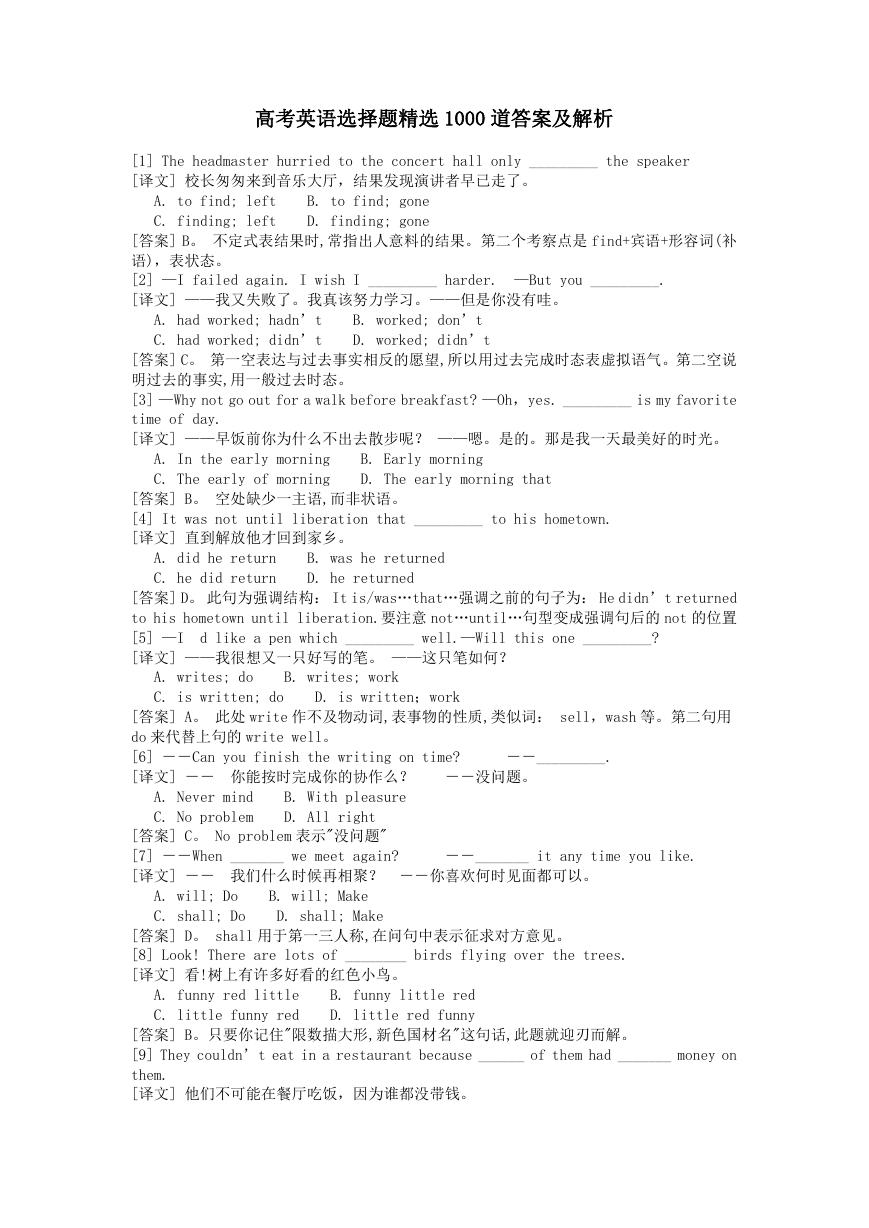
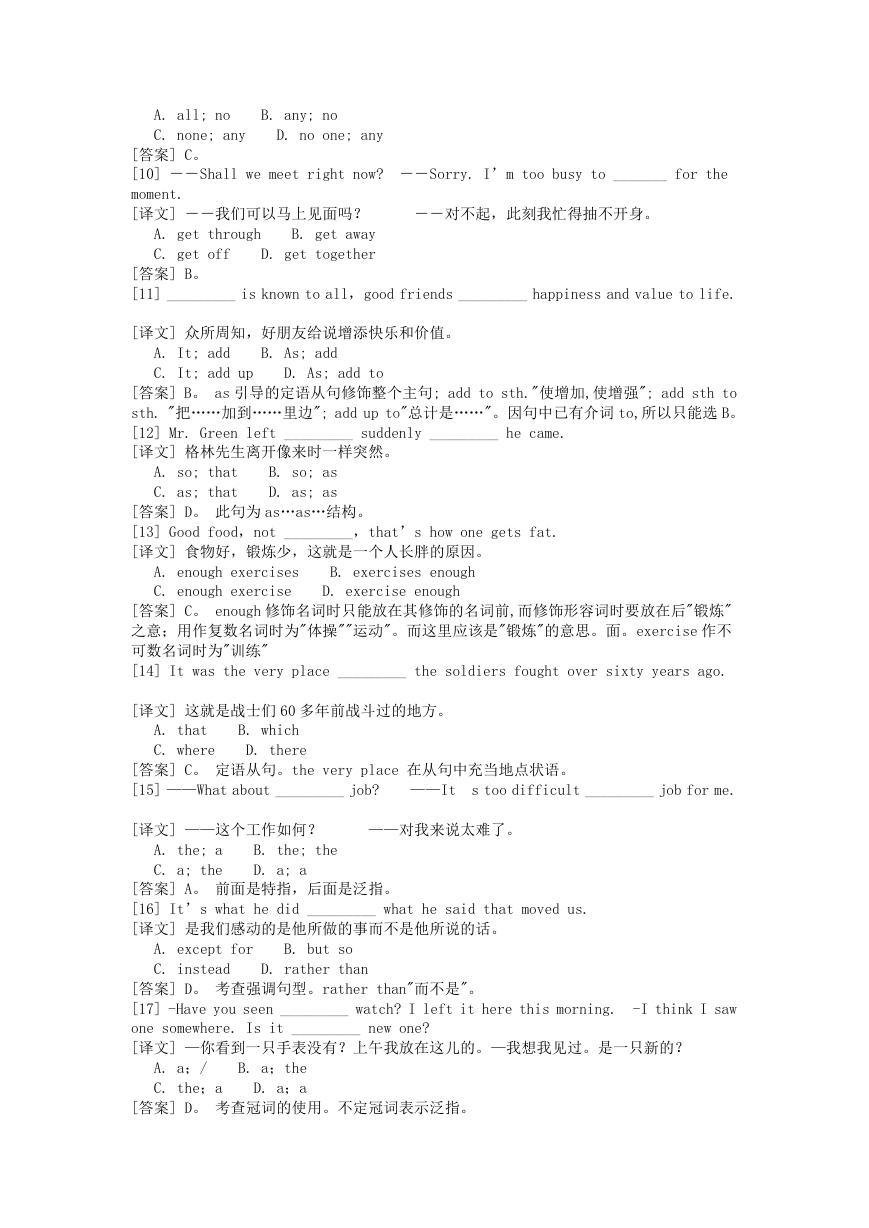
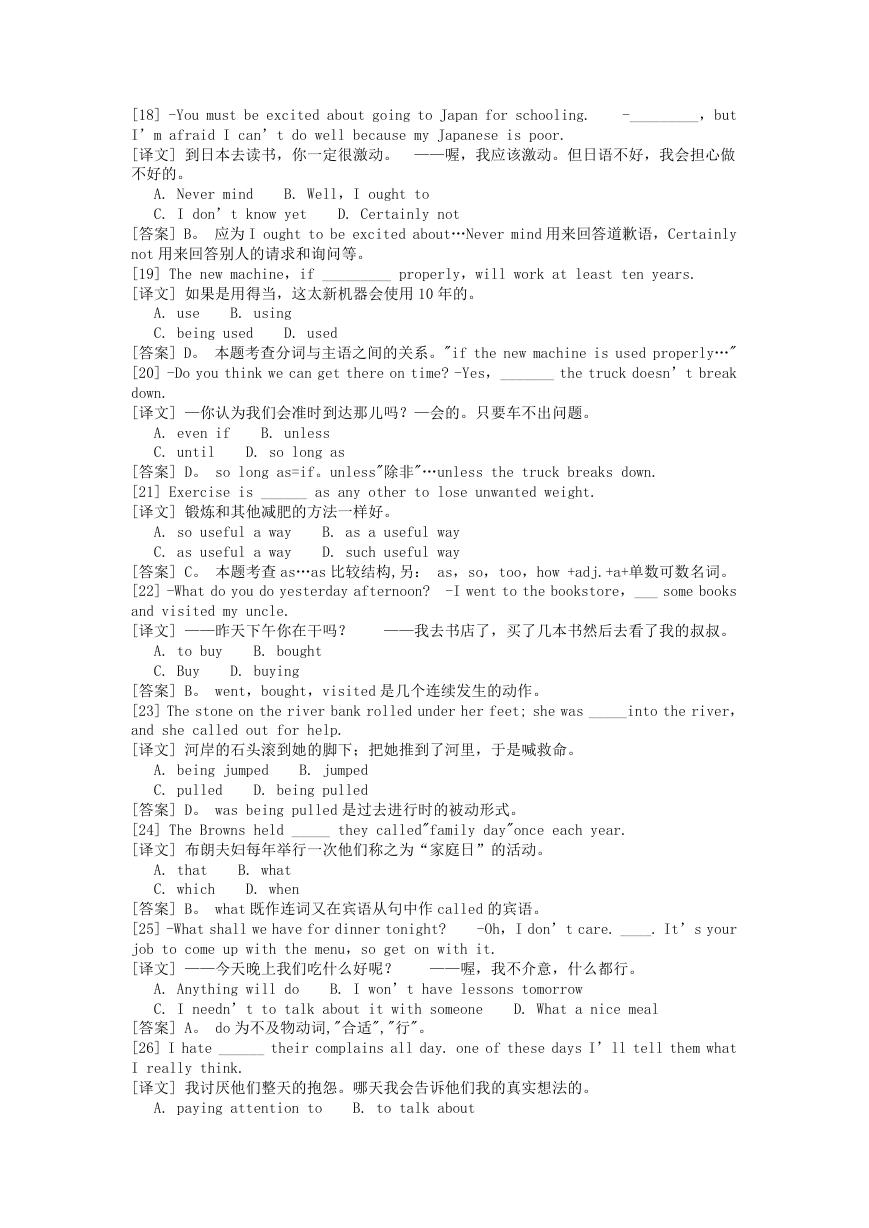
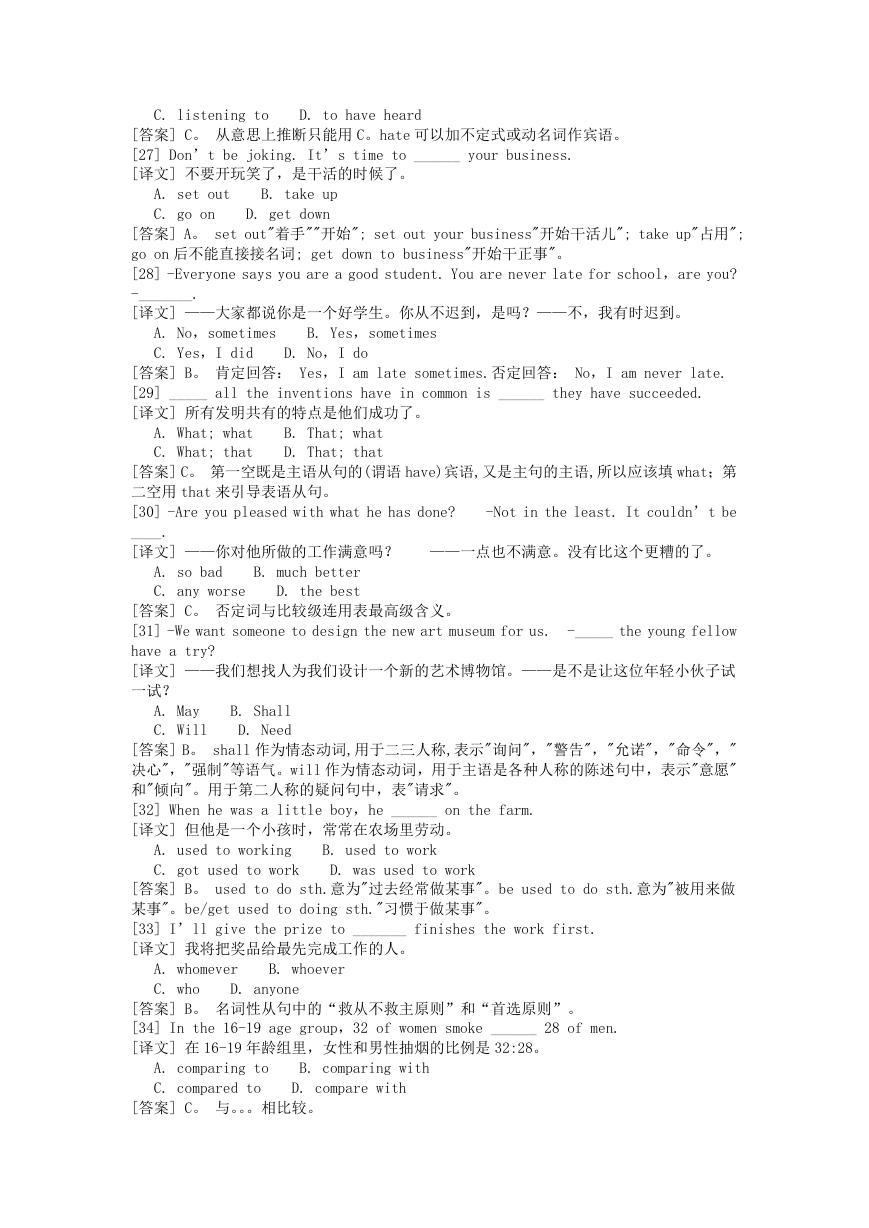
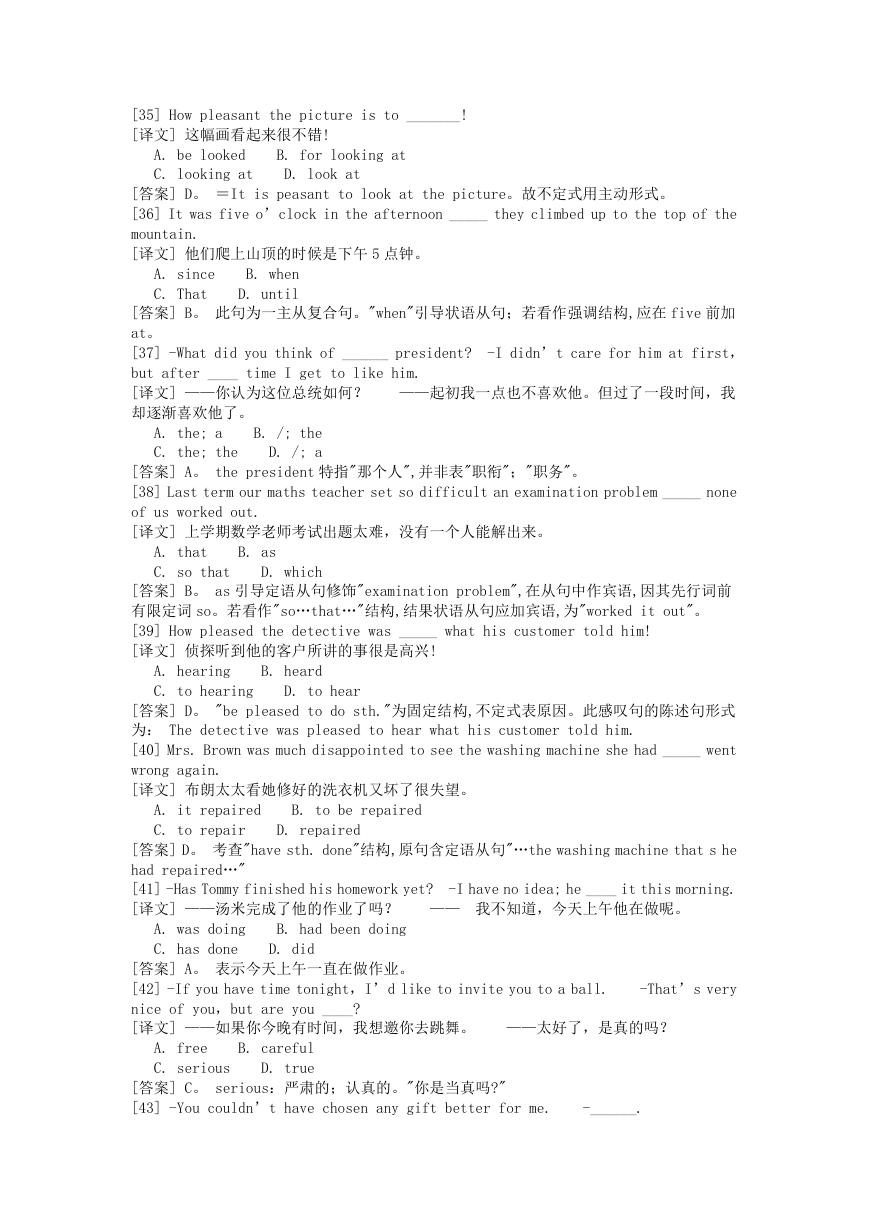
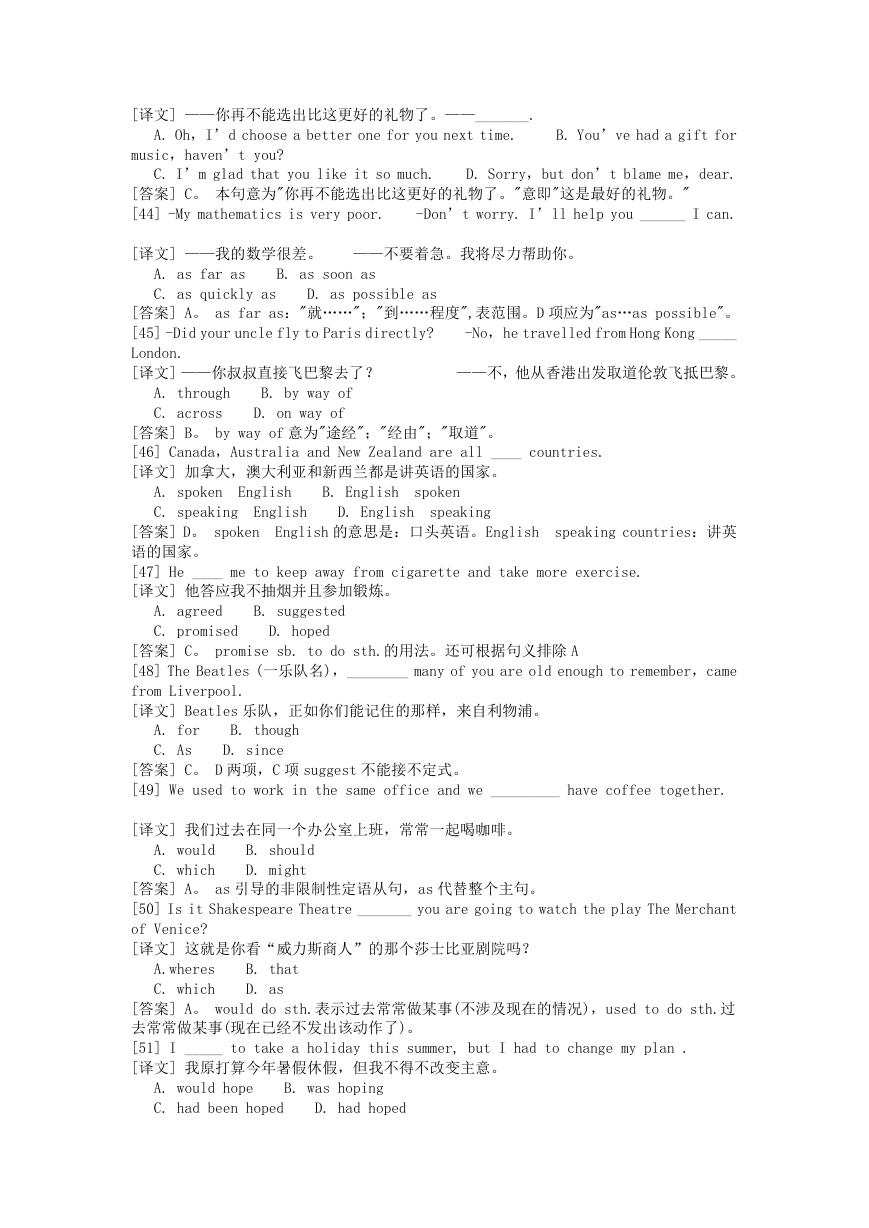
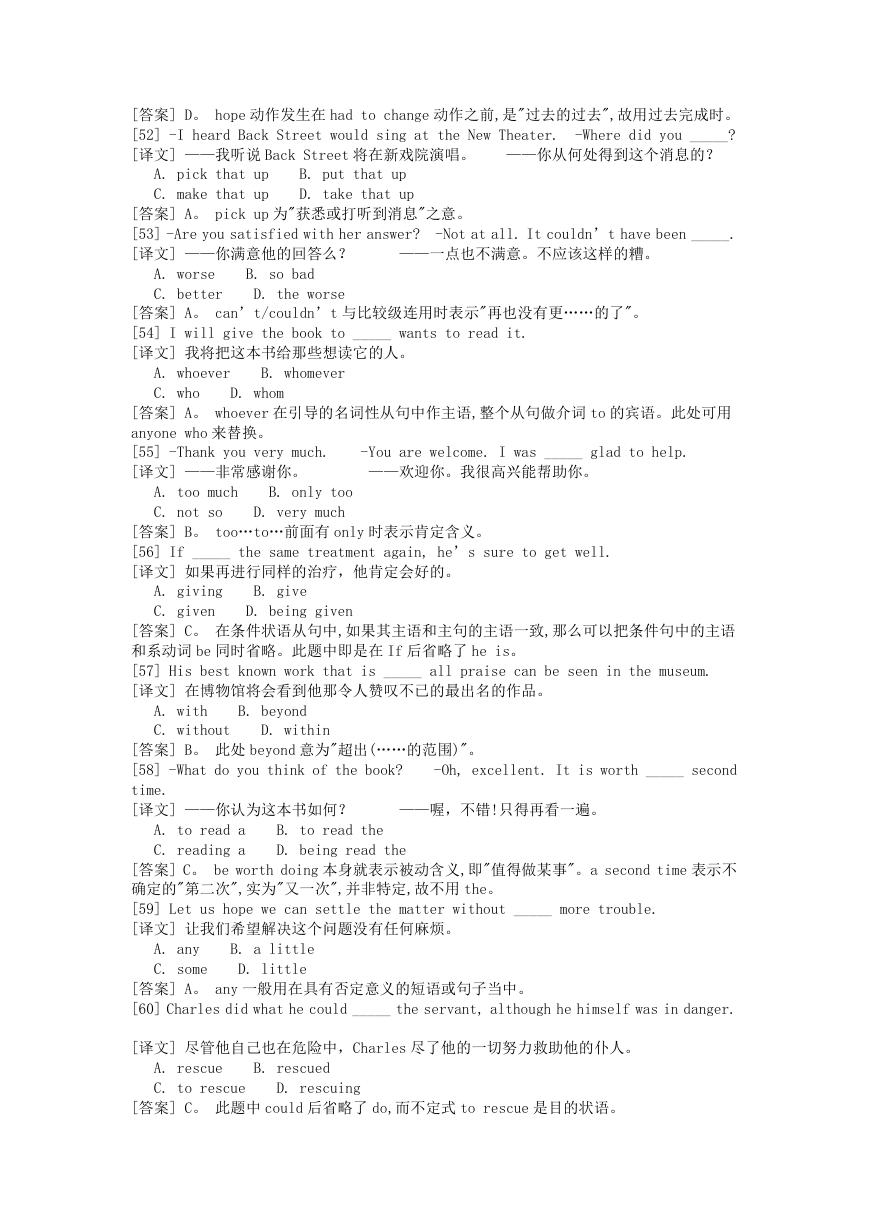
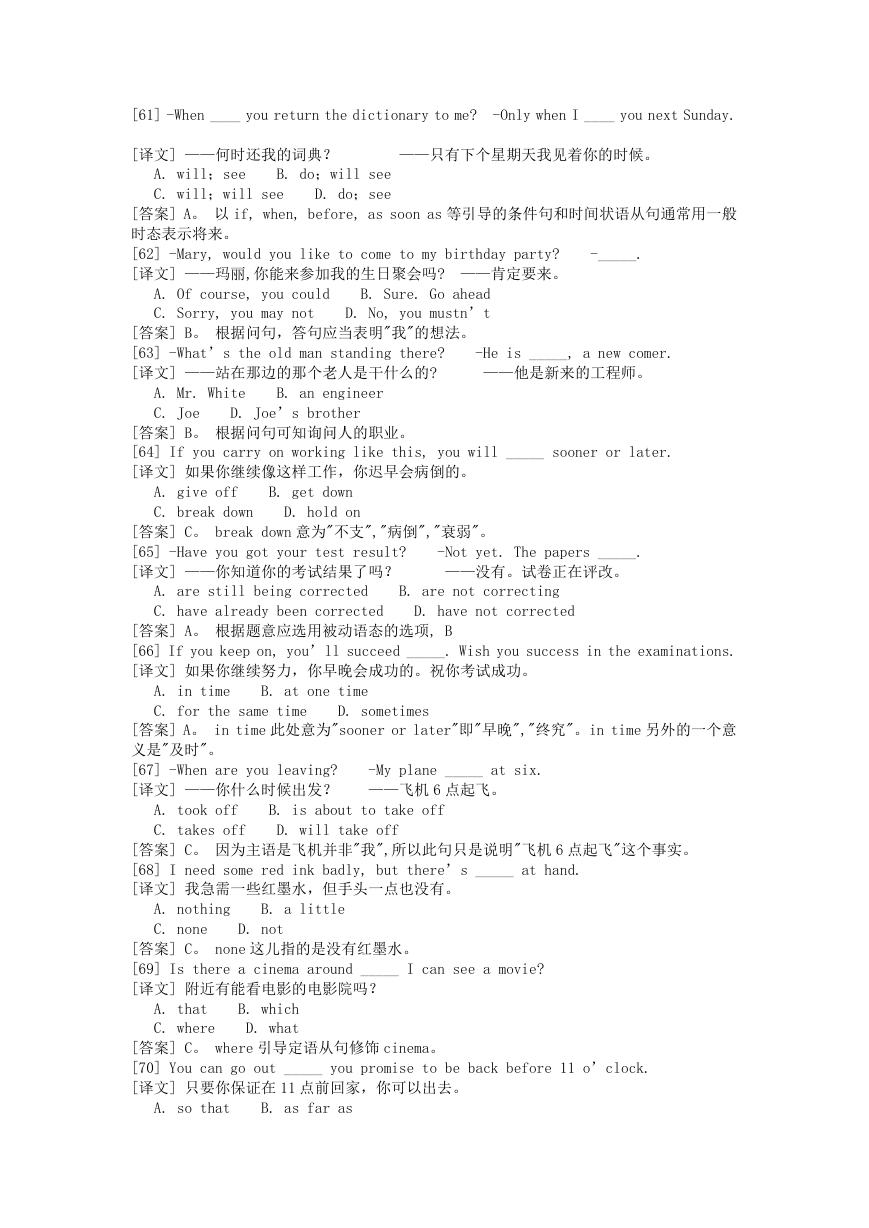








 2023年江西萍乡中考道德与法治真题及答案.doc
2023年江西萍乡中考道德与法治真题及答案.doc 2012年重庆南川中考生物真题及答案.doc
2012年重庆南川中考生物真题及答案.doc 2013年江西师范大学地理学综合及文艺理论基础考研真题.doc
2013年江西师范大学地理学综合及文艺理论基础考研真题.doc 2020年四川甘孜小升初语文真题及答案I卷.doc
2020年四川甘孜小升初语文真题及答案I卷.doc 2020年注册岩土工程师专业基础考试真题及答案.doc
2020年注册岩土工程师专业基础考试真题及答案.doc 2023-2024学年福建省厦门市九年级上学期数学月考试题及答案.doc
2023-2024学年福建省厦门市九年级上学期数学月考试题及答案.doc 2021-2022学年辽宁省沈阳市大东区九年级上学期语文期末试题及答案.doc
2021-2022学年辽宁省沈阳市大东区九年级上学期语文期末试题及答案.doc 2022-2023学年北京东城区初三第一学期物理期末试卷及答案.doc
2022-2023学年北京东城区初三第一学期物理期末试卷及答案.doc 2018上半年江西教师资格初中地理学科知识与教学能力真题及答案.doc
2018上半年江西教师资格初中地理学科知识与教学能力真题及答案.doc 2012年河北国家公务员申论考试真题及答案-省级.doc
2012年河北国家公务员申论考试真题及答案-省级.doc 2020-2021学年江苏省扬州市江都区邵樊片九年级上学期数学第一次质量检测试题及答案.doc
2020-2021学年江苏省扬州市江都区邵樊片九年级上学期数学第一次质量检测试题及答案.doc 2022下半年黑龙江教师资格证中学综合素质真题及答案.doc
2022下半年黑龙江教师资格证中学综合素质真题及答案.doc